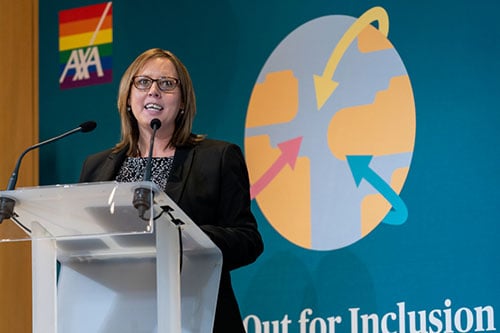

March might feel like a lifetime ago but it was only a few months since the head of people engagement, culture & strategy at AXA UK, Zoe Ashdown (pictured above) last spoke with Insurance Business. In that interview, Ashdown highlighted how the definition of male success must be broadened to allow women to take full advantage of career opportunities. Since then the coronavirus (COVID-19) pandemic has dramatically accelerated working practices, moving many of these forward several years in a matter of months.
Ashdown has seen first-hand how the pandemic has impacted a shift in the skills profile of staff and transformed employee expectations when it comes to their workplaces facilitating remote working. Now, as we look forward, there will be a range of business processes that organisations will need to focus on following the pandemic.
“Looking at the health and wellness space, I think these offerings will become an expectation and a differentiator rather than a ‘nice to offer’, as more will be expected of employers moving forward,” she noted. “These are the factors that have been accelerated, and you will be left behind if you aren’t addressing those areas.”
Throughout her own extensive career in the employee engagement sphere, Ashdown has never known an event of such scale and impact when it comes to shaping the future of working practices. While it can be difficult to find the positives in the coronavirus pandemic, she has been struck by the unprecedented change that this crisis has had on the focus of businesses when it comes to their staff.
“When you think of business continuity and resilience programmes, they’ve traditionally been focused on the hard-coded areas of the business, whether that’s the data, or the tech, or the systems, or the premises, whereas now there is such an interest in people-related matters. This pandemic has shown that people actually need to be the starting point of any plan moving forward.”
Ashdown paid tribute to the employees at AXA UK, highlighting how they have adapted to the extensive changes in their working conditions with tremendous speed and agility.
“Many of our employees have got children or caring responsibilities, and now they’re juggling those on top of dealing with their homes now being their workplace,” she said. “People like their jobs and they want to continue working but balancing all of this can be a pressure. The key is making sure that people feel supported and know that if they are facing hurdles or challenges, then they have so many options available to them.”
There is a multitude of ways in which businesses can provide this safety net to their employees and ensure that they are sustained throughout the crisis. To ensure the welfare of its staff and to relieve pressure on the NHS, AXA has implemented a variety of support including continually sharing guidance on how to stay mentally and physically fit at home and offering a broad array of benefits such as access for all employees and their dependents to a virtual GP.
Providing innovative solutions has been central to the creation of the initiatives that the business is offering at this time, and Ashdown highlighted how these are used not only to increase the engagement of staff with the business, but also with those they live with, and each other. From cooking classes for the under-fives, to yoga sessions, to utilising the know-how of AXA’s PPP healthcare experts, offerings have ignited the interest of the company’s employees. Working parents have also been given an additional 20 days of emergency leave on top of the usual five days to support childcare arrangements.
In her previous discussion, Ashdown noted the need for men to take advantage of flexible working programmes, and she is now hopeful that the widespread uptake of flexible working may lead to the normalisation of these processes. Many people have remarked that after the pandemic has passed, things cannot just go back to normal, and that is also true for the way that people work.
“I think in some cases this experience has normalised but also humanised the relationships that we have. You can see how people tend to act slightly different when their children are around them and, in many cases, we have seen different sides to our colleagues that you don’t always see in the office environment,” she said.
“There’s also the fact that there isn’t a date set in stone for going back into the office or for changing these working practices. So it’s going to be a long-term project and it’s going to be really fluid, with periods of ambiguity. And we are, all of us, going to have to continue being flexible in the way we work and how we adapt.”
